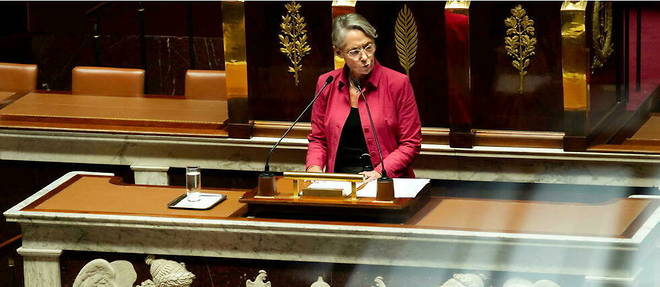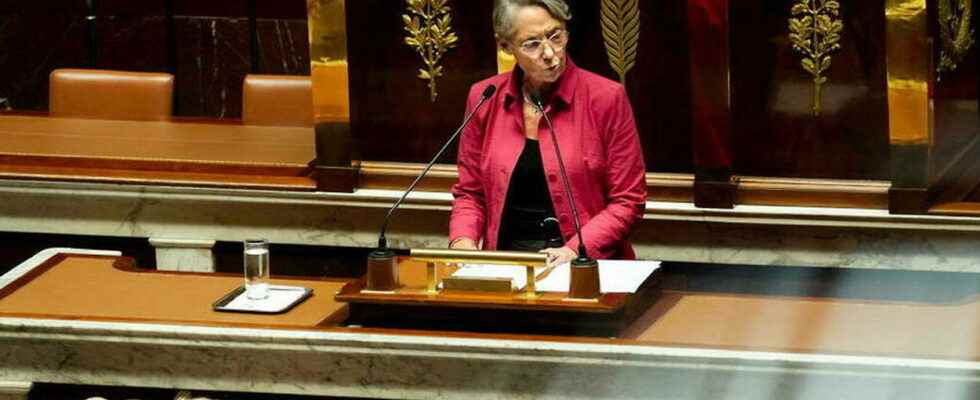A Cluster 17 study for “Le Point” reveals that a majority of our fellow citizens are unfavorable to the use of this constitutional tool.
By Alice Pairo-Vasseur

© GAUTHIER BEDRIGNANS / Hans Lucas / Hans Lucas via AFP
Published on
Link copied
Copy link
FFaced with the stalemate in the debates and the multiplication of amendments tabled, Prime Minister Élisabeth Borne – without an absolute majority – used paragraph 3 of article 49 of the Constitution three times in one week. and provoked as many motions of censure.
While the Matignon tenant could still use it several times in the coming weeks, what do the French think of the use of this constitutional tool? This is the subject of a study carried out by the independent polling institute Cluster 17, for Point (out of a sample of 2,393 people). Results ? A clear majority of them believe that the government was wrong to use this article and hope that the motions of censure succeed. A majority of respondents also want Emmanuel Macron to dissolve the National Assembly.
A 49.3 rejected by the French
63% of French people think, in fact, that the government was wrong to resort to 49.3 to pass the finance bill, teaches us this survey. Highly contested since its use in 2015 and 2016, this article is synonymous with a forced passage, even an “undemocratic” measure for some French people, reveal the authors of the study.
READ ALSO“The good surprise of the new school year”: at the heart of the Borne method
Moreover, among the 31% of French people in favor of using this constitutional tool, the majority of them belong to the electorate of the center and the right. 87% of Emmanuel Macron’s voters (in the first round) – who finds, on this point, the support of his electoral base – and 67% of Valérie Pécresse’s voters. The “moderate, qualified and well-to-do left”, supposedly attached to compromise and social dialogue, as the authors of the study point out, shows itself to be more torn: 48% of this “cluster” (or group) is in favor of the use of 49.3 when 43% think that the government is wrong to use it.
Censorship: the French in favor
Second major lesson from this survey: a majority of French people questioned say they are in favor of voting for a motion of censure to overthrow the government (note that this survey was carried out before the filing and voting of motions of censure).
In detail and again, the entire electorate of Emmanuel Macron and Valérie Pécresse – but also to a lesser extent that of Anne Hidalgo and Yannick Jadot – is opposed to it, demonstrating “the strength of demand for stability as a vector of political coagulation”, observe the authors of the study. When the hard core of the Insoumis electorate declares itself in favor of censorship. Like the sociopatriots, refractory and eurosceptic, “clusters” favorable to Marine Le Pen, who also voted for the Nupes motion.
READ ALSOMotion of censorship: LR in the trap of Marine Le Pen?
For a return to the polls
Last lesson of this survey, some French people do not seem to recognize themselves in the current National Assembly: 52% of them declaring themselves in favor of its dissolution, despite a context already heavy with uncertainty.
We find, moreover, more or less the same political balances as on the questions of the use of 49.3 and the vote of a motion of censure. If we observe a desire for dissolution in a large part of the electorate (including in “clusters” such as the social democrats or the conservatives, however little inclined to upheavals), the moderates are much less favorable to the dissolution of the Assembly.
READ ALSOWhy Emmanuel Macron dreams of dissolving the Assembly
And if this survey illustrates the great stability of the political balance of power in the country (the voters of the presidential and legislative elections showing themselves to be particularly united), it also reveals that the tripartition of the electorate remains. An important issue for Emmanuel Macron, plagued by the risk of revolt and instability within his majority. And for good reason, a dislocation of the latter could weaken its hard core which, sensitive to compromises and respect for democracy, could also be reluctant to use the 49.3 too often.
